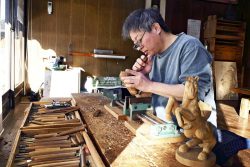- Social Series
- AFTERMATH OF A MURDER
1 Year Since Abe Shooting / Abe’s Death Left LDP Without Figure to Unite Party Conservatives
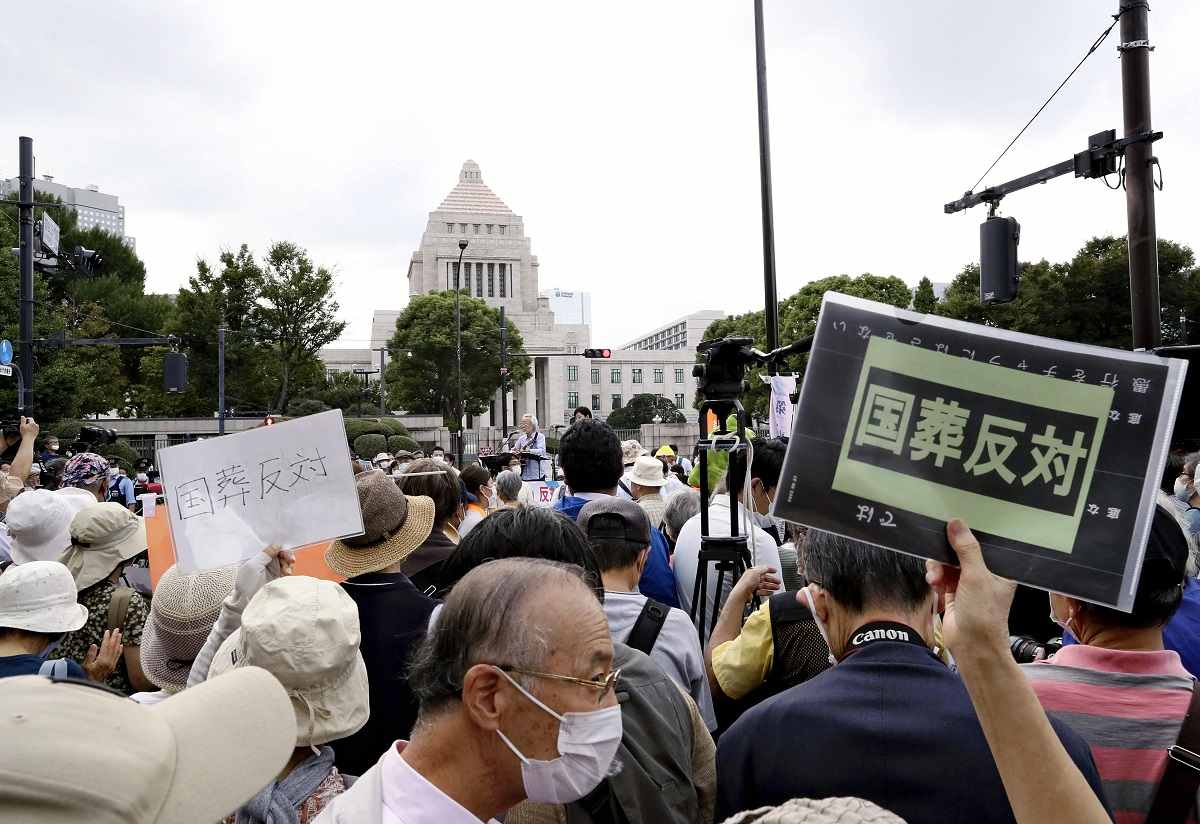
People opposing former Prime Minister Shinzo Abe’s state funeral demonstrate in front of the Diet Building in Chiyoda Ward, Tokyo, on September 27, 2022, the day of the funeral.
The Yomiuri Shimbun
15:28 JST, July 11, 2023
One year has passed since former Prime Minister Shinzo Abe was shot to death while giving a campaign speech for a House of Councillors election candidate in Nara on July 8 last year. What impact has the killing had on Japanese society and politics? This is the third and final installment of a series on the lasting ramifications of the incident.
※※※
The ordinary Diet session that ended on June 21 saw the last-minute passing of legislation designed to promote understanding of gender and sexual minorities, often referred to as the LGBT community. This event underscored the absence of former Prime Minister Shinzo Abe, who before his death had still wielded influence as the “core of the conservatives” within the ruling Liberal Democratic Party.
“There are widespread concerns, and serious opposition to the legislation” — so said Satsuki Katayama, a member of the House of Councillors, at LDP headquarters in late May. Katayama was conveying to Seiji Kihara, deputy chief cabinet secretary and the closest aide to Prime Minister Fumio Kishida, the concerns that had been voiced about the LGBT bill, which had been submitted to the Diet by the ruling parties.
Katayama was a leader of the efforts in May 2021 to block the party’s approval of an LGBT bill and its submission to the Diet, communicating with Abe as she did so.
Compiled at Kishida’s direction in the run-up to the G7 summit, the recently passed bill stipulates that there should be “no unfair discrimination” against LGBT people. However, the definition of discrimination remains vague. There have been concerns that a man with malicious intent could attempt to enter a women’s restroom while claiming to be a woman, and that any attempt to keep him out could be rejected as “unfair discrimination” under the LGBT law.
According to a source in the LDP, a senior official of Nippon Kaigi (Japan Conference), a conservative group of intellectuals and businessmen who were part of Abe’s rock-solid support base, had told the LDP that “if your party allows such a bill to become law, we can no longer support the LDP.”
The group even hinted at the possibility of supporting Nippon Ishin (Japan Innovation Party) instead of the LDP in Osaka. In early June, Kihara told people around him, “I never thought things would turn out like this.”
Even after the bill was submitted, there were cautious views within the LDP over the start of deliberations. But Kishida pushed to get it passed quickly.
Many believe that Kishida wanted to avert continued criticism from the Constitutional Democratic Party of Japan and other parties about the LDP taking a “backward-looking stance” on LGBT policies, and that he was also showing consideration for coalition partner Komeito, which had consistently demanded that the bill be passed into law.
Relations with Komeito had also deteriorated over election cooperation.
Ultimately the bill was passed, incorporating nearly all the main points in proposals made by Ishin and the Democratic Party for the People, which were responding to the concerns of conservatives. The bill clearly stipulated, for example, that consideration should also be given to non-LGBT individuals.
There were no internal debates within the LDP on amending the bill, and the deliberations at the committees of both houses of the Diet, including the House of Representatives, lasted for only about three hours each. Only a few members of the LDP left the room when the votes were taken.
Following Abe’s death, there appear to be no successors to unite the conservative members of the LDP. The Abe faction, the largest in the party, remains without a chairperson and its influence is declining. One conservative party member said: “If Abe were still alive, he would have gone directly to the Prime Minister’s Office to talk with Kishida. And I think Abe would have been able to apply more of a brake on the prime minister.”
Abe was also a disputant on national security. On the issue of the security-related legislation, which allows for the limited exercise of the right of collective self-defense, he confronted opposition parties’ interpellators with his own words, sometimes even getting emotional, and responded to them day after day in the Diet.
While Kishida has paved the way for strengthening the nation’s defense capabilities — including the possession of counterattack capabilities, which Abe long desired — Kishida has notably played it safe during Diet deliberations.
After the Cabinet approved three security-related documents, including the National Security Strategy, which clearly states measures to beef up the country’s defense capabilities, Kishida told those around him, “There weren’t any big demonstrations, were there.” He was apparently referring to the fierce opposition to the security-related legislation at the time it was enacted.
The proper path for a prime minister to take when he makes policy decisions that will affect the future of the nation is to squarely explain the significance of those decisions and gain the understanding of many citizens. It is hardly considered a wholesome democracy if things proceed only with lethargic discussions at the Diet.
How will passionate debate be carried on after Abe’s death? The resolve of each politician is being questioned.
It was Abe who was viewed on social media as the center of confrontation in domestic politics, with the “sword of verbal criticism” leveled at him from time to time.
The first Abe administration was inaugurated in 2006 just at the dawn of social media. That was the year Twitter Inc. was founded, and Facebook, which had been a service limited to university students, was also opened to the general public.
While Abe was lying low and waiting for a chance to make a comeback on the political scene, social media spread fast within Japan. Online right-wingers called “net-uyo,” who were known to make radical claims on social media, cheered Abe’s bid for reelection to the LDP presidency in 2012.
In his second administration, Abe strengthened security policies, for instance, by allowing the country the limited exercise of the right of collective self-defense, while also expressing his desire to revise the Constitution.
He won over the conservative segment — the LDP’s firm support base — and even voters without party affiliations by launching Abenomics, a comprehensive policy package to revitalize the economy in which the public took great interest.
At the same time, he tried to divide the opposition camp by calling for wage hikes and advocating work-style reform, while thoroughly attacking leftist forces. This was the secret to his party winning lower house elections, which are based on a single-seat constituency system in which the ruling party faces its opposition rivals one-on-one, and to his establishing a long-lasting administration, which was sometimes referred to as “Abe’s predominant power.”

Then Prime Minister Shinzo Abe speaks during an upper house Budget Committee session in Tokyo in February 2019.
In his memoirs titled “Abe Shinzo: Kaikoroku,” published by Chuokoron-Shinsha Inc., Abe recalled that he “was always in a fighting pose.”
However, this political stance, when combined with social media characteristics such as the “filter bubble” of being surrounded only by like-minded views and the “echo chamber” in which people with similar opinions gather to form extreme ideas, has resulted in people becoming radicalized in their opinions, whether for or against Abe.
It happened in front of JR Akihabara Station in Tokyo on the evening of July 1, 2017. As Abe gave a speech in support of a candidate running in the Tokyo metropolitan assembly election, opponents who had come together via social media shouted at him while holding a banner that read, “Abe, step down!”
Abe responded, “I cannot give in to these people.” Footage of just this remark spread on social media, leading to criticism of Abe.
Also illustrative were the reactions seen to the state funeral held for Abe on Sept. 27 last year. Prof. Fujio Toriumi of the University of Tokyo, who specializes in computational social sciences, counted tweets about the funeral between July 6 and Sept. 18 of the same year and found approximately 1.83 million tweets in favor of the state funeral and 2.96 million against it.
On the day of the funeral, groups in favor of the event and groups against it held demonstrations around the Nippon Budokan, where the funeral was held. Foreign media reported on “a divided Japan.”
Brazil’s Congress was attacked in January this year, influenced by disinformation and conspiracy theories that spread on social media, and a similar incident involving supporters of former President Donald Trump occurred 2½ years ago in the United States. Democracy is said to be under threat.
These days, Japanese politicians also transmit various messages daily through social media. One year has passed since Abe was shot and killed, and postings with provocative hashtags like “#I will be killed by the LDP” and “#I will be killed by Kishida” have been rife on social media.
Harukata Takenaka, a professor at the National Graduate Institute for Policy Studies, said, “On social media, you can’t see the other party, just their text, which makes conflicts more intense.”
“Politicians should use social media as a means of transmitting information, but they shouldn’t overreact to radical comments. Discussions should be kept face-to-face,” Takenaka said.
Related Articles
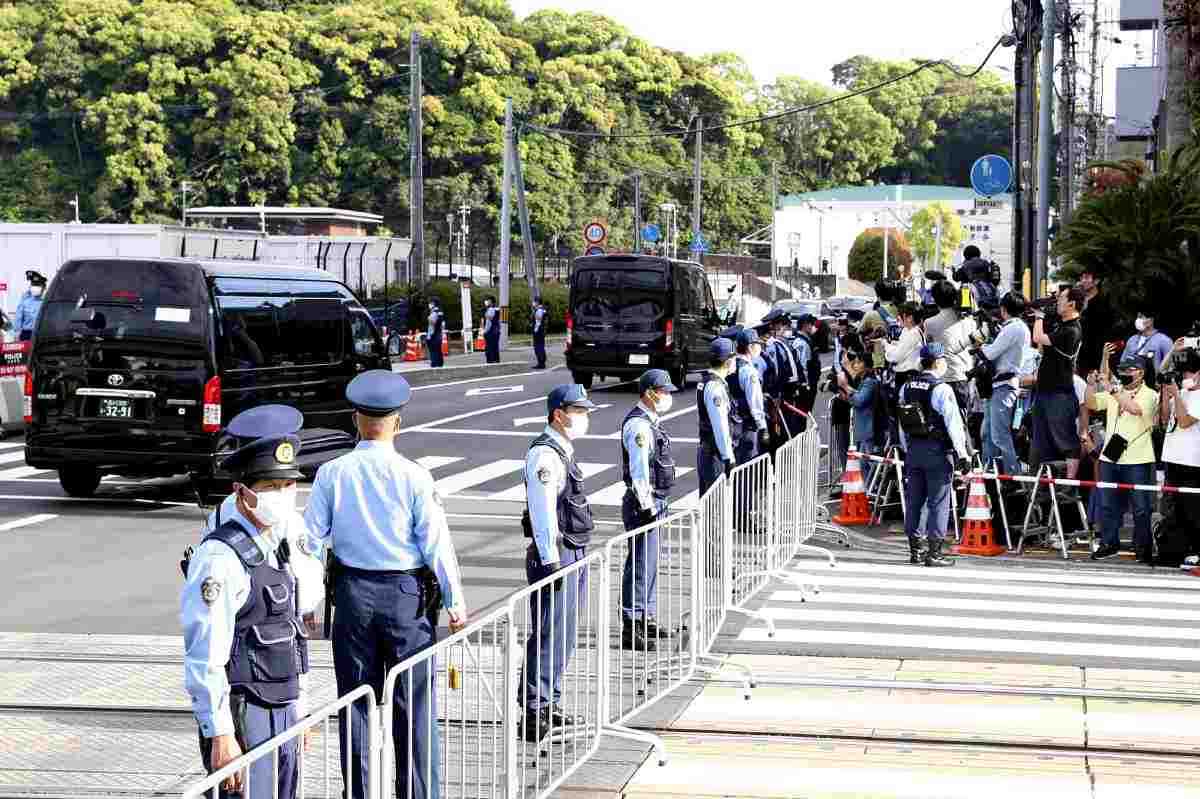
1 Year Since Abe Shooting / Japan Weighs How Best to Protect Dignitaries Against ‘Lone-wolf’ Attacks
Most Read
Popular articles in the past 24 hours
-

TEPCO to Reactivate Nuclear Reactor at Kashiwazaki-Kariwa Power P...
-

Tae Hitoto Leads Japanese Cyclists Planning Trip Around Taiwan to...
-

Travel Across PokéPark KANTO, Searching Far and Wide for Your Fav...
-

Israeli Ambassador to Japan Speaks about Japan’s Role in the Reco...
-
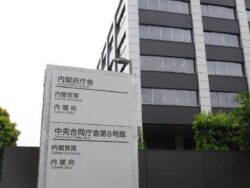
Japan’s Govt Sets Goal for World’s No. 3 in Number of Highly Cite...
-
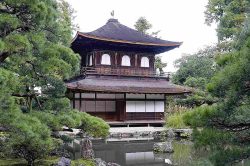
Japan's Ginkakuji Temple to Increase Admission Fees for 1st Time ...
-
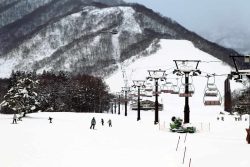
Australian Woman Died of Asphyxiation in Nagano Ski Lift Accident...
-
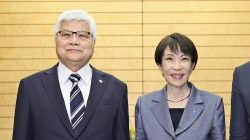
TMSC to Produce 3-Nanometer Semiconductors in Japan's Kumamoto Pr...
Popular articles in the past week
-

Man Infected with Measles May Have Come in Contact with Many Peop...
-

Australian Woman Dies After Mishap on Ski Lift in Nagano Prefectu...
-

Foreign Snowboarder in Serious Condition After Hanging in Midair ...
-

Chinese Embassy in Japan Reiterates Call for Chinese People to Re...
-

Narita Airport, Startup in Japan Demonstrate Machine to Compress ...
-

Toyota Motor Group Firm to Sell Clean Energy Greenhouses for Stra...
-

Beer Yeast Helps Save Labor, Water Use in Growing Rice; Govt Hope...
-

Japan Tourism Agency Calls for Strengthening Measures Against Ove...
Popular articles in the past month
-

Univ. in Japan, Tokyo-Based Startup to Develop Satellite for Disa...
-

JAL, ANA Cancel Flights During 3-day Holiday Weekend due to Blizz...
-

Japan Institute to Use Domestic Commercial Optical Lattice Clock ...
-

China Eyes Rare Earth Foothold in Malaysia to Maintain Dominance,...
-

China Confirmed to Be Operating Drilling Vessel Near Japan-China ...
-

Man Infected with Measles May Have Come in Contact with Many Peop...
-

Japan, Qatar Ministers Agree on Need for Stable Energy Supplies; ...
-

Australian Woman Dies After Mishap on Ski Lift in Nagano Prefectu...
Top Articles in Society
-

JAL, ANA Cancel Flights During 3-day Holiday Weekend due to Blizzard
-

Man Infected with Measles May Have Come in Contact with Many People in Tokyo, Went to Store, Restaurant Around When Symptoms Emerged
-

Australian Woman Dies After Mishap on Ski Lift in Nagano Prefecture
-

Foreign Snowboarder in Serious Condition After Hanging in Midair from Chairlift in Nagano Prefecture
-

Record-Breaking Snow Cripples Public Transport in Hokkaido; 7,000 People Stay Overnight at New Chitose Airport
JN ACCESS RANKING
-

Univ. in Japan, Tokyo-Based Startup to Develop Satellite for Disaster Prevention Measures, Bears
-

JAL, ANA Cancel Flights During 3-day Holiday Weekend due to Blizzard
-

Japan Institute to Use Domestic Commercial Optical Lattice Clock to Set Japan Standard Time
-

China Eyes Rare Earth Foothold in Malaysia to Maintain Dominance, Counter Japan, U.S.
-

Man Infected with Measles May Have Come in Contact with Many People in Tokyo, Went to Store, Restaurant Around When Symptoms Emerged







